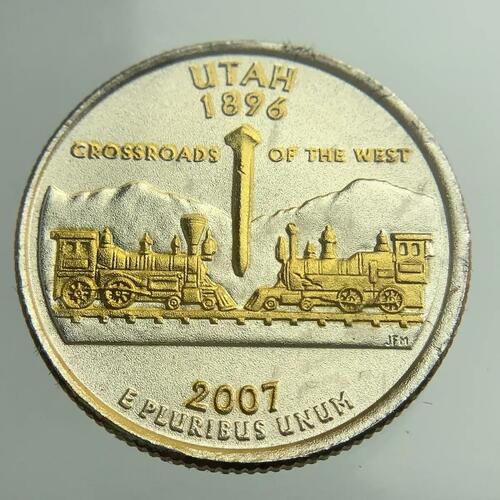
Authored by Jp Cortez via The Mises Institute,
Utah Governor Spencer Cox has signed legislation explicitly empowering the state treasurer to protect state funds with an allocation to physical gold and silver.
Sponsored by Rep. Ken Ivory, House Bill 348 permits – but does not require – the Treasurer to hold up to 10 percent of certain state reserve accounts in physical gold and silver to help secure state assets against the risks of inflation and financial turmoil and/or to achieve capital gains as measured in Federal Reserve Notes.
The Treasurer has limited options for holding, managing, and investing Utah’s state monies, making this legislation necessary in order for gold and silver to be included.
Utah’s reserves are invested almost exclusively in corporate bonds and banking agencies. These debt instruments appear to have low volatility, but they carry other risks – including pernicious inflation and the steady erosion in real value of principal, coupled with interest rates that are often negative in real terms.
The legislation specifically pertains to the State Disaster Recovery Restricted Account, General Fund Budget Reserve Account, Income Tax Fund Budget Reserve Account, and the Medicaid Growth Reduction and Budget Stabilization Account.
Backed by the Sound Money Defense League, Money Metals Exchange, and in-state advocates, House Bill 348 does not grant authority to buy stocks, futures contracts, or other financial instruments.
“By allowing the state treasurer to invest in the monetary metals, Utah is better equipped to protect Utah taxpayer funds, and the residents of Utah, against inflation and counterparty risk,” said Jp Cortez, executive director of the Sound Money Defense League.
An allocation to physical gold and silver fits squarely within the objective of protecting Utah’s state funds against financial risks and would logically be included in a list of safe investment options. The monetary metals can provide a hedge against inflation, debt default risks, and stock market declines – and have historically boosted investment returns while also reducing volatility.
Texas and Ohio have previously acquired gold. Meanwhile, legislation like HB 348 is under consideration right now in Missouri, Tennessee, Idaho, and West Virginia.
The new law also prompts the state treasurer to conduct a study “analyzing the role of precious metals in augmenting, stabilizing, and ensuring the economic security and prosperity of the state, the families and residents of the state, and businesses in the state.”
The study is to be submitted to the Revenue and Taxation Interim Committee on or before the committee's October interim committee meeting any recommendations for legislation as per the study’s findings.
Utah has been among the leading states promoting sound money public policy, starting with the passage of the Utah Legal Tender Act in 2011, also led by Rep. Ivory. The enactment of Utah House Bill 348 comes on the heels of Wisconsin this week becoming the 44th state in the country to end the sales tax on the purchase of gold and silver.
Authored by Jp Cortez via The Mises Institute,
Utah Governor Spencer Cox has signed legislation explicitly empowering the state treasurer to protect state funds with an allocation to physical gold and silver.
Sponsored by Rep. Ken Ivory, House Bill 348 permits – but does not require – the Treasurer to hold up to 10 percent of certain state reserve accounts in physical gold and silver to help secure state assets against the risks of inflation and financial turmoil and/or to achieve capital gains as measured in Federal Reserve Notes.
The Treasurer has limited options for holding, managing, and investing Utah’s state monies, making this legislation necessary in order for gold and silver to be included.
Utah’s reserves are invested almost exclusively in corporate bonds and banking agencies. These debt instruments appear to have low volatility, but they carry other risks – including pernicious inflation and the steady erosion in real value of principal, coupled with interest rates that are often negative in real terms.
The legislation specifically pertains to the State Disaster Recovery Restricted Account, General Fund Budget Reserve Account, Income Tax Fund Budget Reserve Account, and the Medicaid Growth Reduction and Budget Stabilization Account.
Backed by the Sound Money Defense League, Money Metals Exchange, and in-state advocates, House Bill 348 does not grant authority to buy stocks, futures contracts, or other financial instruments.
“By allowing the state treasurer to invest in the monetary metals, Utah is better equipped to protect Utah taxpayer funds, and the residents of Utah, against inflation and counterparty risk,” said Jp Cortez, executive director of the Sound Money Defense League.
An allocation to physical gold and silver fits squarely within the objective of protecting Utah’s state funds against financial risks and would logically be included in a list of safe investment options. The monetary metals can provide a hedge against inflation, debt default risks, and stock market declines – and have historically boosted investment returns while also reducing volatility.
Texas and Ohio have previously acquired gold. Meanwhile, legislation like HB 348 is under consideration right now in Missouri, Tennessee, Idaho, and West Virginia.
The new law also prompts the state treasurer to conduct a study “analyzing the role of precious metals in augmenting, stabilizing, and ensuring the economic security and prosperity of the state, the families and residents of the state, and businesses in the state.”
The study is to be submitted to the Revenue and Taxation Interim Committee on or before the committee’s October interim committee meeting any recommendations for legislation as per the study’s findings.
Utah has been among the leading states promoting sound money public policy, starting with the passage of the Utah Legal Tender Act in 2011, also led by Rep. Ivory. The enactment of Utah House Bill 348 comes on the heels of Wisconsin this week becoming the 44th state in the country to end the sales tax on the purchase of gold and silver.
Loading…



